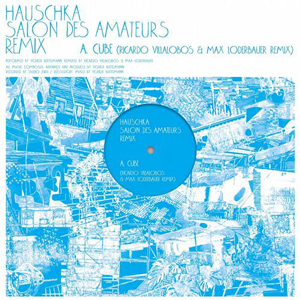Hauschka Salon des Amateurs Remixes
Last year, Dusseldorf-based composer Hauschka released Salon des Amateurs, an inventive, classically informed ode to […]

Last year, Dusseldorf-based composer Hauschka released Salon des Amateurs, an inventive, classically informed ode to house and techno music performed on his “prepared” piano. (For the uninitiated, check out NPR’s fantastic video series, in which he details his technique of piling seemingly random household objects like bottle caps, leather, and marbles onto/under the strings/hammers of his piano to cull new and unusual noises from the instrument’s 88 keys.) On his latest release, he pushes Salon des Amateurs deeper into the world of electronic music by selecting a number of heavyweight producers to rework it into a captivating, techno-leaning record.
Salon des Amateurs Remixes opens with a reinterpretation of “Radar” by Kompakt boss Michael Mayer, who transforms Haushka’s delicate work into a minimal-techno masterpiece that recalls the neon noir feel of Kavinsky’s retro-futuristic Drive theme. Mayer’s take on “Radar” builds tension slowly and then chips away bits and pieces to make room for a deep, hypnotic bassline that gives the song its backbone. Sound artist and Raster-Noton co-founder Alva Noto also takes a stab at “Radar,” producing a characteristically glitchy, ambient edit far removed from Hauschka’s version.
Hauschka strikes gold tapping Matthew Herbert; his whimsical “Sunrise” mix, which adds layers upon layers of odd and beautiful sounds of indiscernible origins, is a real stunner that embodies the spirit of experimentation that made Salon des Amateurs so appealing in the first place. Lost stalwart Steve Bicknell is also an excellent choice; in his hands, “Tanzbein” is almost unrecognizable—reborn as bludgeoning industrial techno, it’s probably the closest a Hauschka track will ever get to being club ready.
As with “Radar,” there are dueling “Ping” revisions. René Löwe, under his Vainqueur moniker, uses synth delays to reimagine “Ping” as a shimmering, atmospheric number that’s quite beautiful in its divergence from the original. Tolouse Low Trax (a.k.a. Detlef Weinrich, formerly of the ’90s post-rock group Kreidler) also strayed a ways from Hauschka’s composition, but with less success. Gutting all the bells and buzzes that give the song its character wasn’t the wisest decision; perhaps he should’ve chosen a different track instead of going up against one of the best.
The trouble with a lot of remix albums is that they often come off as half-assed throwaways produced to buy time between an artist’s major releases. Thankfully, that’s not the case here. Building on a pair of EPs he released earlier this summer, Salon des Amateurs Remixes ranges from respectful edits to inspired reworkings of tracks from the critically acclaimed album, and stands as a tightly curated collection of high-quality collaborations that allow for deeper exploration of Hauschka’s wonderfully complex compositions.

